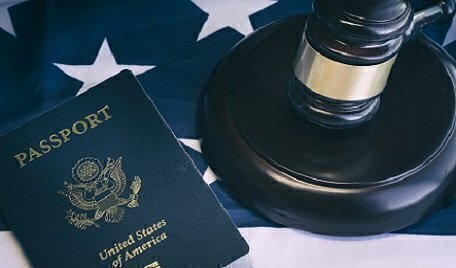In a setback for the Trump Administration, the Supreme Court refused on Monday to adopt a special, fast procedure to rule on the government’s power to shut down the program of Deferred Action for Childhood Arrivals (DACA). The brief order urged a federal appeals court to move “expeditiously” to decide an Administration appeal pending there, leaving open the chance for a later return to the Supreme Court.
 Because Congress currently appears deadlocked on possible action on the future of the DACA program, the Justices’ action on Monday leaves that question up to the courts, at least for the time being. Meanwhile, the Administration will not be allowed to close the program as of next Monday, because that option has been blocked temporarily by two lower federal court orders.
Because Congress currently appears deadlocked on possible action on the future of the DACA program, the Justices’ action on Monday leaves that question up to the courts, at least for the time being. Meanwhile, the Administration will not be allowed to close the program as of next Monday, because that option has been blocked temporarily by two lower federal court orders.
DACA is a program, in existence for more than five years, that protects from deportation nearly 700,000 younger undocumented immigrants who do not have the kind of formal legal status that would allow them to remain in the country. DACA allows them to stay, to work or to study, but does not guarantee them permanent legal status or a path to citizenship. The immigrants, now known widely as “Dreamers,” could not be deported in any mass effort while the decision to end DACA is on hold, but individuals among them could lose their right to remain if they violate the terms of the program.
Federal trial judges in San Francisco and Brooklyn, N.Y., finding that the Administration acted illegally when it decided last September to end DACA as of March 5, have issued temporary orders to keep the program in operation while courts deal with the issue of the shutdown.
The Administration, without waiting for a federal appeals court to review the San Francisco judge’s order, had asked the Supreme Court to step in immediately and grant review on its own, with a decision to be reached by the Justices this term – that is, by the end of June.
That is the unusual plea – a kind that is seldom granted – that the Justices turned down without explanation on Monday. That returned the controversy to the U.S. Court of Appeals for the Ninth Circuit, which has already agreed to move on a fast-track schedule. In the Supreme Court order, the Justices “assume that the Court of Appeals will proceed expeditiously to decide this case.”
In practical terms, the Justices' action makes it seem highly unlikely that the legality of the President’s decision to end DACA will be decided in a final way by the Justices for many months. A court of appeals ruling probably would not come in time for the Supreme Court to decide the issue before the Justices’ summer recess.
Although the Ninth Circuit Court has set a faster-than-usual schedule for the case there, that arranged for the filing of written legal arguments through April 10. It could revisit the schedule now in the wake of the Supreme Court’s denial of immediate review by the Justices, and the mandate for the Ninth Circuit Court to move swiftly could lead that court to shorten its schedule further.
Meanwhile, the Administration last week filed a formal notice of appeal of the Brooklyn judge’s similar order temporarily blocking the end of DACA, with that appeal to go to the U.S. Court of Appeals for the Second Circuit. That court has not yet laid out a schedule for review.
Although the President, in ordering the closing of the program as of March 5, had said that he would revisit that decision if Congress had not done something about the program, government officials have said more recently that the President was not likely to extend the date for closing DACA. That prospect is of no legal consequence, since March 5 is now likely to come and go before action is completed in the courts.
Legendary journalist Lyle Denniston has written for us as a contributor since June 2011 and has covered the Supreme Court since 1958. His work also appears on lyldenlawnews.com.







